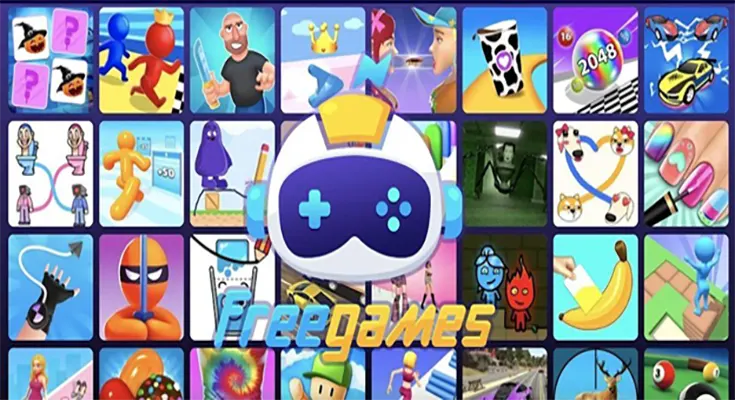In an era characterized by rapid technological advancements, the integration of educational online games into learning environments has become increasingly significant. These interactive tools facilitate not only engagement but also a more profound comprehension of various subjects through innovative methodologies. The concept of “learning through play” embodies a pedagogical approach wherein enjoyment is concurrently derived from the educational process, leading to improved student outcomes.
Educational online games offer numerous benefits that extend beyond traditional classroom instruction. These platforms provide personalized learning experiences that adapt to individual progress and skill levels, making them accessible for diverse learners. Additionally, they cultivate essential skills such as problem-solving, critical thinking, and collaboration among peers. By strategically incorporating kids’ online games into educational curricula, educators and parents can enhance motivation and foster a positive attitude toward learning. In this article, several must-try educational online games will be explored, each designed to maximize both engagement and educational efficacy for students across various age groups. Continue reading to discover practical applications of these tools in your teaching or parenting strategy.
Game 1: Slope Unblocked 76
Slope Unblocked 76 exemplifies the integration of educational online games that effectively engage students while fostering essential skills. As players navigate an increasingly challenging slope, the game necessitates creative problem-solving and critical thinking. Feedback mechanisms within the game allow learners to assess their strategies, enhancing resilience in gaming situations as they face obstacles and strive for improvement. This iterative process mirrors real-life scenarios where creativity and adaptive responses are often required.
Additionally, Slope Unblocked 76 emphasizes collaboration by allowing students to work together or compete against one another in shared environments. Such collaborative experiences promote teamwork and communication, which are crucial components of project-based learning methodologies. For example, a classroom can be transformed into a competitive space where students share strategies for overcoming levels, thereby deepening their understanding through peer interaction. This cooperative atmosphere not only enriches the gaming experience but also reinforces important social skills.
Moreover, the adaptability of Slope Unblocked 76 is notable as it offers tailored lessons across various subject areas such as mathematics and physics. By embedding educational concepts within gameplay mechanics, this platform encourages learners to apply theoretical knowledge in practical contexts. The combination of engaging content and structured educational objectives fosters an environment conducive to both learning and enjoyment, making it easier for educators to integrate these tools into their curriculums effectively.
As a versatile tool that transcends traditional teaching methods, Slope Unblocked 76 stands out in its capacity to deliver meaningful educational experiences while ensuring maximum student engagement. Embracing such educational online games can lead to improved outcomes in academic achievement alongside heightened enthusiasm for learning.
Game 2: Prodigy Math
Prodigy Math is a digital learning tool designed to transform the conventional approach to mathematics by integrating game mechanics that enhance engagement. The platform utilizes a role-playing format where students embark on quests, solve problems, and compete in battles—all while practicing math concepts aligned with their curriculum. By merging gaming elements with educational content, Prodigy Math captures student interest and motivates them to tackle math challenges more enthusiastically than traditional learning methods.
One of the key features of Prodigy Math is its adaptive learning technology, which customizes experiences based on individual student progress and skill levels. This system assesses each learner’s performance in real-time, adjusting questions and challenges accordingly to ensure that they are neither too easy nor overly challenging. As a result, students receive personalized feedback that promotes mastery of topics at their own pace. Such adaptability makes it an effective choice for diverse learners within a classroom environment or for independent study at home.
Additionally, Prodigy Math covers a broad range of mathematical topics that adhere to educational standards, thereby ensuring relevance to school curricula. Subject areas include arithmetic, geometry, algebra, and more advanced concepts tailored for different age groups. This comprehensive approach makes it suitable for various educational contexts—enhancing both skill-building activities and formative assessments as teachers can track student performance through detailed analytics provided by the platform.
In summary, Prodigy Math serves as an impactful resource among skill-building games available today, effectively enriching students’ mathematical knowledge while fostering an engaging online experience. By combining fun gameplay with rigorous academic content, Prodigy Math not only aids in concept retention but also encourages exploration and confidence in tackling complex equations—a critical component of lifelong learning in mathematics.
Game 3: Low’s Adventure 2!
Lows Adventures 2 is an educational online game designed to enhance interactive learning through a series of quizzes and challenges. This platform encourages learners to engage actively with the material, rather than passively consuming information. Its structured approach allows students to apply knowledge in real-time, increasing retention and comprehension. Each level presents unique obstacles and questions that are aligned with educational standards across various subjects, reinforcing core concepts while providing enjoyment.
The game also fosters healthy competition among students, which can significantly enhance engagement levels. By introducing leaderboards and achievement badges, players are motivated to improve their scores and strive for mastery of content areas. For instance, when a student answers a difficult quiz question correctly, they not only gain points but also see their name rise on the leaderboard. This environment promotes a sense of camaraderie as learners support one another in achieving academic goals, which makes learning both enjoyable and effective.
Low’s Adventure 2! offers customizable content tailored to different age groups and subject matters. Educators can adjust the difficulty levels based on the needs of their students, ensuring that everyone can participate at a challenging yet manageable level. Furthermore, this adaptability enables teachers to create targeted assessments for specific skills or topics that align with curriculum objectives. As such, it serves as an excellent tool for differentiating instruction in diverse classrooms.
In summary, Low’s Adventure 2! exemplifies how educational online games can transform traditional learning methods into dynamic experiences. Through interactive quizzes and competitive gameplay, learners are kept engaged while developing critical thinking skills essential for academic success. The combination of fun educational activities with structured content creates an enriching environment conducive to effective learning outcomes.
Game 4: Duolingo
Duolingo is an exemplary platform that facilitates language acquisition through gamified lessons, making the learning process both accessible and enjoyable. The application employs a structured approach to language learning by breaking down complex linguistic concepts into manageable tasks. Each lesson incorporates interactive elements such as quizzes, listening exercises, and matching games, which contribute to engaging game-based learning experiences. This design not only supports the development of academic competencies in vocabulary and grammar but also fosters retention through repetition and varied formats.
Immediate feedback is a distinctive feature of Duolingo that enables learners to assess their progress in real time. After completing each task, users receive instant corrections for errors along with explanations, ensuring that misunderstandings are clarified promptly. This mechanism allows learners to identify areas where they may need improvement, thus enhancing their confidence and motivating further engagement. Additionally, this immediacy provides a sense of accomplishment upon correctly answering questions or completing a level, which is instrumental in sustaining learner interest.
The application also promotes consistent practice through daily goals and rewards. By setting specific targets—such as completing a certain number of lessons or maintaining a streak of consecutive study days—users are encouraged to integrate language practice into their daily routines. Reward systems such as virtual currency or badges serve as incentives, reinforcing positive behaviors while simultaneously cultivating intrinsic motivation toward continued learning endeavors. This structured approach equips students not only with foreign language skills but also with essential habits necessary for self-directed learning.
In summary, Duolingo offers an effective model for language education by intertwining gaming mechanics with pedagogical principles. The platform’s focus on immediate feedback and consistent practice contributes significantly to building academic competencies while fostering a love for language learning among its users. As educators seek innovative methods to engage students in meaningful ways, integrating tools like Duolingo can lead to enhanced outcomes within classroom settings.
Game 5: Cookie Clicker 2
Cookie Clicker 2 serves as an engaging platform for early learners to cultivate essential skills while exploring various subjects. Educational online games like this one are designed to be captivating, utilizing interactive elements that resonate with younger audiences. Through a simple yet enticing gameplay mechanic, where players click on virtual cookies to generate more cookies, children can inadvertently develop strong foundational numeracy skills as they perform addition and multiplication calculations in order to maximize their outputs.
The game extends beyond mathematics; it introduces concepts related to economics and resource management. Players strategically invest collected cookies into upgrades aimed at increasing production efficiency. Such decision-making processes promote critical thinking and introduce young players to basic principles of economic theory, such as supply and demand. These mechanics help create a comprehensive learning experience where students gain exposure to multiple subject areas in an enjoyable format.
Additionally, Cookie Clicker 2 enables progress tracking features that facilitate monitoring of skill development for both parents and educators. As players advance through the game, they can visualize their growth through various milestones achieved, offering insights into areas requiring further reinforcement. For instance, if a learner struggles with understanding exponential growth concepts, the metrics provided by the game’s analytics can inform tailored interventions or discussions at home or in class.
By incorporating educational online games like Cookie Clicker 2 Unblocked into learning environments, children are afforded opportunities not only for knowledge acquisition but also for skill application in real-world scenarios. Awareness of economic concepts alongside fundamental math reinforces important life skills while simultaneously making learning effective and fun.
Additional Benefits of Educational Online Games
Educational online games provide numerous advantages that extend beyond the immediate learning objectives. One significant benefit is the development of resilience in students. As players encounter challenges and obstacles within game environments, they learn to adapt their strategies and persist despite setbacks. For example, a game requiring players to solve complex puzzles may necessitate multiple attempts before success is achieved. This iterative process instills a sense of determination and grit, key attributes that contribute to personal growth both inside and outside educational contexts.
Furthermore, these games promote adaptability by fostering strategic thinking and flexibility in problem-solving approaches. Many educational games require students to evaluate situations carefully, analyze potential outcomes, and adjust their actions accordingly. A prime instance is Prodigy Math, which continuously adjusts difficulty levels based on individual performance feedback. This dynamic environment encourages students to think critically about their strategies while simultaneously reinforcing mathematical concepts tailored specifically to their skill set.
In addition to individual benefits, educational online games can effectively supplement traditional classroom learning methods. When incorporated thoughtfully into the curriculum, these tools provide engaging ways for students to practice skills studied in class but often lack interactive application opportunities. For instance, using platforms like Duolingo allows language learners to practice vocabulary through gamified lessons rather than rote memorization alone. In this manner, educators can bridge the gap between theoretical knowledge and practical application, enhancing overall student comprehension.
Overall, the integration of educational online games serves as a valuable adjunct to conventional teaching practices while facilitating important life skills such as resilience and adaptability amongst learners. By embracing these technologies in various subjects and age groups, teachers can foster engaging learning environments that resonate with today’s digital-native students.
Conclusion and Next Steps
In summary, educational online games represent a valuable tool for fostering engagement and enhancing the learning experience for students across various subjects. By integrating these interactive resources into daily routines at home or in school environments, parents and educators can facilitate meaningful skill development while simultaneously making learning enjoyable. Key strategies for implementation include dedicating specific time slots during which gaming can occur, ensuring that these activities align with curriculum requirements, and selecting appropriate titles based on the age group and educational objectives.
It is imperative for parents, teachers, and school administrators to recognize the importance of leveraging educational online games. As digital mediums continue to influence learning paradigms, proactive steps should be taken to incorporate these innovative tools effectively. This approach not only supports engagement but also enhances knowledge retention among students. Immediate action is recommended; start today by identifying suitable online games that cater to the educational needs of your learners.



